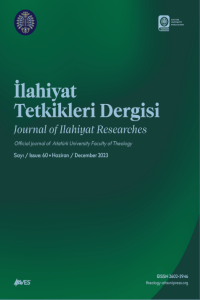Okulda Din Eğitimine Yönelik Tutum Ölçeğinin (ODEYTÖ) Geliştirilmesi: Geçerlik ve Güvenirlik Çalışması
Development of an Attitude Scale Towards Religious Education at School (ASTRES): Validity and Reliability Study
Author(s): Recep Murat, Mahmut ZenginSubject(s): Education, Theology and Religion, Sociology of Culture, Sociology of Education, Sociology of Religion
Published by: Atatürk Üniversitesi İlahiyat Fakültesi
Keywords: Attitude; RCEK Course; Religious Attitude; Religious Culture and Ethics Knowledge; Religious Education; Religious Instruction;
Summary/Abstract: This study aims to develop an attitude scale toward religious education at school to determine high school students’ attitudes toward Religious Education (RE). The study was conducted with 607 high school students, 293 for exploratory factor analysis and 314 for confirmatory factor analysis. The attitude scale toward religious education at school and a personal information questionnaire were used to collect the research data. Initially, an item pool consisting of 73 items was created. According to the expert opinions and the results of the pilot application, a 53-item scale form was reached and applied before the exploratory factor analysis. After exploratory factor analysis, 25 items were removed from the scale, and a new scale comprised 28 items before confirmatory factor analysis. As a result of confirmatory factor analysis, three more items were removed from the scale, and the final structure with 25 items was reached. The attitude scale toward religious education at school consists of three factors (attitude toward the RE, Religious Culture and Ethics Knowledge course, and Religious Culture and Ethics Knowledge teachers) and 25 items. The total variance explaining the three factors was found to be 57.35%. The Kaiser– Meyer–Olkin value of the scale was 0.936; the Barlett’s test value is 4814.065. This shows that the scale is suitable for factor analysis, and the data obtained from the sample are sufficient. As a result of reliability analysis, Cronbach Alpha reliability coefficient .963; The split-half reliability analysis value was .797 and the t-test results conducted between the 27% lower and upper group scores to determine the discrimination levels of the dimensions were found t(85)=−33.55, −29.62, −47.77, −40.60; p < .01 respectively. Since the confirmatory factor analysis results meet the model fit indices, which are the essential criteria, at a very good level, it is considered that the structure created is also suitable from the statistical and theoretical perspectives. In conclusion, it has been determined that the 25-item attitude scale toward religious education at school developed for high school students is valid and reliable.
Journal: İlahiyat Tetkikleri Dergisi
- Issue Year: 2023
- Issue No: 60
- Page Range: 50-63
- Page Count: 14
- Language: Turkish

